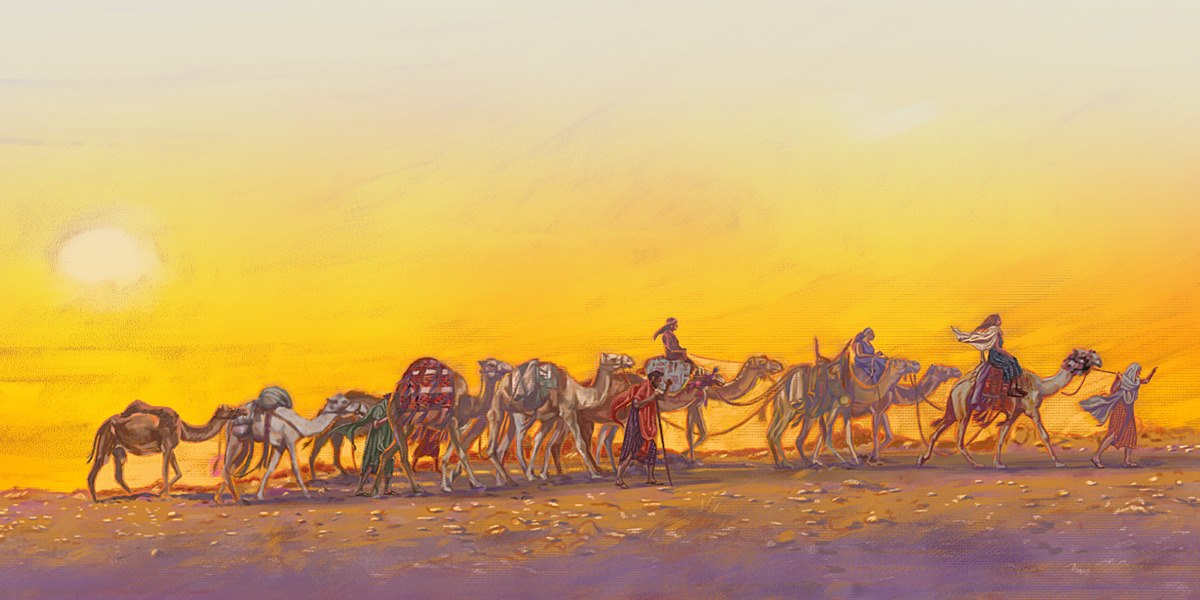Framed by the death and burial of Sarah and Abraham, is the meeting of Rebecca and Isaac, Rivkah & Yitzchak; a story that will culminate with the first time in the Torah a man will be described as “loving” a woman. Not Adam & Eve, all alone in the Garden; not Noah and his dedicated (maybe reluctant?) wife; not even Abraham & Sarah, who travel the world together with the same mission uniting them, but the almost speechless Yitzchak and the vivacious Rivkah. What would Freud say about the last verse in Genesis 24?
ממוסגרת במותם וקבורתם של שרה ואברהם, נמצא את פגישתם של רבקה ויצחק, סיפור שיגיע לשיאו עם הפעם הראשונה בתורה שגבר יתואר כ”אוהב” אישה. לא אדם וחווה, הגם שהיו לגמרי לבד בגן; לא נח ואשתו המסורה (ואולי קצת מתנגדת בכל זאת?); ואפילו לא אברהם ושרה, שמסתובבים להם בעולם היחד עם אותה משימה המאחדת אותם, אלא יצחק הכמעט אילם, ורבקה התוססת. מה היה פרויד אומר על הפסוק האחרון בבראשית כד?
וַיְבִאֶהָ יִצְחָק, הָאֹהֱלָה שָׂרָה אִמּוֹ, וַיִּקַּח אֶת-רִבְקָה וַתְּהִי-לוֹ לְאִשָּׁה, וַיֶּאֱהָבֶהָ; וַיִּנָּחֵם יִצְחָק, אַחֲרֵי אִמּוֹ.
And Isaac brought her into his mother Sarah’s tent, and took Rebekah, and she became his wife; and he loved her. And Isaac was comforted for his mother.
We might be tempted to say that Isaac loves Rivkah as if he replaces his mom. The only challenge is that Rivkah is really a lot more like Abraham! This is evident in the parallels between two stories: when Abraham runs around to care for his guests (Genesis 18), and when Rivkah does the same, with the same verbs and Hebrew roots, to give water to the unknown servant as well as his ten camels (Genesis 24). And if we missed it, commentators will remind us that gamal – camel, the carrier to Rivkah to the Land – is at least linguistically related to gemilut chasadim, doing acts of kindness.
אולי נתפתה לומר שיצחק אוהב את רבקה כי הוא מחפש תחליף לאמא שלו. האתגר היחיד הוא שרבקה באמת דומה הרבה יותר לאברהם! הדבר ניכר בהקבלות בין שני סיפורים: כאשר אברהם מתרוצץ ודואג לטפל באורחיו (בראשית יח), וכאשר רבקה עושה את אותו דבר, עם אותם פעלים ושורשים עבריים, כדי לתת מים לעבד האלמוני וגם לעשרת הגמלים איתם הגיע (בראשית כ”ד). ואם פספסנו, יזכירו לנו הפרשנים שגמל, המוביל של רבקה לארץ – קשור לפחות מבחינה לשונית לגמילות חסדים.
And, consider this: while most other Biblical men have a 2nd, 3rd and often many more – wife, Isaac has only one. He never leaves the Land of Israel. He never takes a second wife. In our tradition, he stands for gevura & din – strength, might, judgement; and it is all about a solid, quiet, loyal presence. Their love is that of two opposites who are attracted from “first sight” and hold on tightly in the many storms life presents.
And yet, they didn’t “invent” it all.
זאת ועוד: בשעה שלרוב הגברים התנ”כיים יש אישה שנייה, שלישית ולעתים קרובות הרבה יותר, ליצחק יש רק אחת. הוא לעולם לא עוזב את ארץ ישראל. הוא אף פעם לא לוקח אישה אחרת על פני רבקה. במסורת שלנו, הוא מייצג גבורה ודין – כוח, חוזק, שיפוט צודק; כל כולו אומר נוכחות מוצקה, שקטה, נאמנה. אהבתם היא של שני הפכים שנמשכים זה לזו מ”מבט ראשון” ומחזיקים חזק בסערות הרבות שהחיים מעמידים בפניהם.
ועדיין, הם לא “המציאו” הכל מחדש…
The Talmud offers us a beautiful imagery when describing Abraham & Sarah’s final resting (Tractate baba Batra 58a). It seems like in the mind of the Torah and the Talmud, eternal love is totally possible:
התלמוד מציע לנו דימוי יפיפה בתיאור המנוחה האחרונה של אברהם ושרה (מסכת בבא בתרא ל”ח:א). נראה שבדעת התורה והתלמוד, אהבה נצחית אפשרית:
| רב בנאה היה מציין (ממפה) מערות (קבורה). כשהגיע למערתו של אברהם, פגש באליעזר, עבר אברהם עומד בפתח (המערה). אמר לו (רב בנאה לאליעזר): מה עושה אברהם (עכשיו)? אמר לו (אליעזר לרב בנאה): אברהם שוכב בחיקה של שרה, והיא מסתכלת לו בראשו. | Rabbi Bena’a was marking burial caves (he was doing that so people know where there are burial places which would help prevent contracting of ritual impurity). When he arrived at the cave of Abraham, (the Cave of Machpelah), he chanced upon Eliezer, Abraham’s servant, standing before the entrance. Rabbi Bena’a said to him: What is Abraham doing (right now)? Eliezer said to him: He is lying in the arms of Sarah, and she is examining his head. |
This Torah portion begins with a burial and ends with another one, and in between, this love story… coincidence? Interestingly, in Hebrew, kever is a gravesite, and the Talmud uses the very same word to refer to womb… maybe hinting that, at times, where one thing ends, another begins.
הפרשה הזו מתחילה בקבורה ומסתיימת בקבורה, ובין לבין סיפור האהבה הזה… צירוף מקרים? אנחנו יודעים שבעברית, קבר הוא מקום קבורה, והתלמוד משתמש באותה מילה בדיוק כדי להתייחס לרחם… אולי הדבר רומז שלפעמים, כאשר דבר אחד מסתיים, דבר אחר מתחיל.
שבת שלום – SHABBAT SHALOM
- Song of Songs 8:7


Lovely. I just read that Gemara too. Really interesting. What do you make of it? צריך עיון.
שבת שלום קלודיה
>
Possibly- Sarah is pulling out the “klipot” from Abraham. Abraham is אב המון גויים and is about the belief in one G-d which can be expressed one way via Islam and one way, via Judaism. But Sarah, is only “Judaism” (not crazy about this word, but you know what I mean -). Sarah is particular, only about Isaac and she’s the one separating this from that. This is also why the Torah portion is called “Chayey Sarah” – her life mission now lives on in Isaac and especially, Rebekkah. It’s also seen in the haftara, when Bat Sheva says the king lives on forever… isn’t he on his deathbed?! but through he right heir, he lives on.
Hope this helps! Thank you for reading!
אני מבינה 90%—אולי כי אני הקשבתי לך! המילה המיוחדת בשבוע הזה: לפספס.